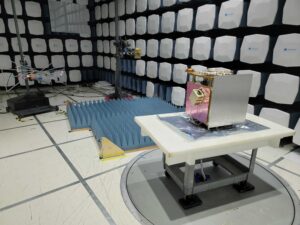The contract is a Phase 2 SBIR sponsored by the Space and Missile Systems Center. The company will get $1.5 million to help fund the development of an edge computer processor that will function as a “brain” on Loft Orbital spacecraft.
Loft Orbital is a San Francisco-based startup that buys satellite buses to host payloads provided by customers who pay a fee to ride to space.
The company wants to offer edge computing aboard its satellites as part of its service. Onboard computing allows satellites to process data they collect and perform autonomous decision-making and tasks faster than if the data had to be transported to a server on the ground.
Loft Orbital’s edge computing technology is similar to the “Pit Boss” that the Defense Advanced Research Projects Agency is developing for its Blackjack constellations for autonomous satellite operations.
Brian Bone, head of Loft Orbital’s government business, said an edge computer can work in concert with a cloud while it’s connected, or separately when it’s not.
An example of an edge computer might be a single satellite that is performing earth observation tasks as part of a global network of sensors.
As part of the contract, Loft will develop a machine learning software to autonomously detect and counter cyber threats onboard the spacecraft. The contract funds a hardware-in-the-loop demonstration on the ground.
Bone said the goal is to sell the Space Force the full “space infrastructure as a service” package. The company would fly government customer payloads to space aboard its satellites and the government would use the edge computing environment to run applications, and analyze remote sensing or weather data.



